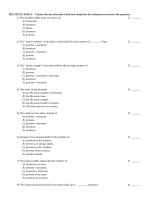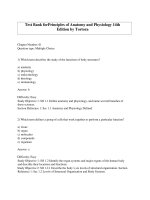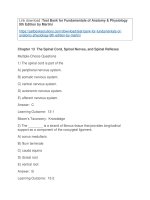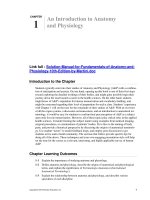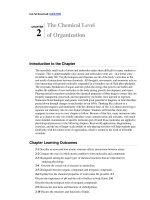Test bank for fundamentals of anatomy and physiology 4th edition by rizzo
Bạn đang xem bản rút gọn của tài liệu. Xem và tải ngay bản đầy đủ của tài liệu tại đây (194 KB, 8 trang )
Test Bank for Fundamentals of Anatomy and Physiology 4th Edition by Rizzo
Full
file at />Name:
Class:
Date:
Chapter 01
True / False
1. Anatomy is the study of diseases in the body.
a. True
b. False
ANSWER: False
2. The organs of any cavity are referred to as the viscera.
a. True
b. False
ANSWER: True
3. The smallest unit of life is the cell.
a. True
b. False
ANSWER: True
4. There are four types of muscle in the human body.
a. True
b. False
ANSWER: False
5. The prostate gland, penis, and urethra belong to the male reproductive system.
a. True
b. False
ANSWER: True
Multiple Choice
6. The study of the structure or morphology of the body and how the body parts are organized is called ____.
a. pathology
b. physiology
c. anatomy
d. histology
ANSWER: c
Copyright Cengage Learning. Powered by Cognero.
Full file at />
Page 1
Test Bank for Fundamentals of Anatomy and Physiology 4th Edition by Rizzo
Full
file at />Name:
Class:
Date:
Chapter 01
7. The head is ____ to the heart.
a. superior
b. distal
c. deep
d. inferior
ANSWER: a
8. A ____ plane is any plane that divides the body into superior and inferior portions.
a. frontal
b. midsagittal
c. coronal
d. transverse
ANSWER: d
9. The ____ cavity is divided into the cranial cavity and the spinal cavity.
a. ventral
b. dorsal
c. thoracic
d. abdominopelvic
ANSWER: b
10. The wrist is ____ to the elbow.
a. proximal
b. superior
c. distal
d. superficial
ANSWER: c
11. The diaphragm muscle separates the ____ cavity from the abdominopelvic cavity.
a. dorsal
b. cranial
c. spinal
d. thoracic
ANSWER: d
Copyright Cengage Learning. Powered by Cognero.
Full file at />
Page 2
Test Bank for Fundamentals of Anatomy and Physiology 4th Edition by Rizzo
Full
file at />Name:
Class:
Date:
Chapter 01
12. The heart is located within the ____ cavity.
a. pleural
b. pericardial
c. abdominal
d. cranial
ANSWER: b
13. What are the smallest living units of biologic organization?
a. atoms
b. cells
c. organelles
d. systems
ANSWER: b
14. Structures composed of similar cells that perform similar functions are known as ____.
a. tissues
b. classes
c. molecules
d. organs
ANSWER: a
15. The skin is ____ to the heart.
a. deep
b. superior
c. superficial
d. distal
ANSWER: c
16. The stomach and bladder are contained in the ____ cavity.
a. dorsal
b. cranial
c. thoracic
d. abdominopelvic
ANSWER: d
Copyright Cengage Learning. Powered by Cognero.
Full file at />
Page 3
Test Bank for Fundamentals of Anatomy and Physiology 4th Edition by Rizzo
Full
file at />Name:
Class:
Date:
Chapter 01
17. Which tissue covers surfaces and forms glands?
a. epithelial
b. connective
c. muscle
d. nervous
ANSWER: a
18. Which tissue binds together and supports other tissues and organs?
a. epithelial
b. connective
c. muscle
d. nervous
ANSWER: b
19. The lungs and heart are located in the ____ cavity.
a. abdominopelvic
b. dorsal
c. thoracic
d. cranial
ANSWER: c
20. Cardiac muscle is found only in the ____.
a. stomach
b. liver
c. lungs
d. heart
ANSWER: d
21. Skin, hair, and nails belong to the ____ system.
a. integumentary
b. muscular
c. digestive
d. endocrine
ANSWER: a
Copyright Cengage Learning. Powered by Cognero.
Full file at />
Page 4
Test Bank for Fundamentals of Anatomy and Physiology 4th Edition by Rizzo
Full
file at />Name:
Class:
Date:
Chapter 01
22. The ____ system is involved in controlling, correlating, and regulating the other body systems.
a. integumentary
b. nervous
c. digestive
d. urinary
ANSWER: b
23. What term is used for the maintenance (within varying narrow limits) of the internal environment of the body?
a. physiology
b. homeostasis
c. pathology
d. epithelium
ANSWER: b
24. The ____ plane divides the body into two equal left and right portions.
a. transverse
b. frontal
c. horizontal
d. midsagittal
ANSWER: d
25. Body temperature control is an example of ____, a process by which the body responds to a stimulus by correcting
the change and bringing the body back to the original setting.
a. positive feedback
b. endocrinology
c. negative feedback
d. pathology
ANSWER: c
26. What type of muscle is found along the digestive tract?
a. smooth
b. cardiac
c. skeletal
d. vascular
ANSWER: a
Copyright Cengage Learning. Powered by Cognero.
Full file at />
Page 5
Test Bank for Fundamentals of Anatomy and Physiology 4th Edition by Rizzo
Full
file at />Name:
Class:
Date:
Chapter 01
27. Changes in body temperature are detected by the ____.
a. thymus
b. pituitary
c. hypothalamus
d. thalamus
ANSWER: c
28. The first contraction during labor results in stronger and stronger contractions of the uterus. This process is an
example of ____.
a. negative feedback
b. endocrinology
c. pathology
d. positive feedback
ANSWER: d
29. The ____ system brings oxygen to, and eliminates carbon dioxide from, the blood.
a. respiratory
b. digestive
c. urinary
d. endocrine
ANSWER: a
30. The ____ functions to convert food into simpler substances that along with other nutrients can be absorbed by the
cells of the body.
a. respiratory
b. digestive
c. urinary
d. endocrine
ANSWER: b
31. The study of the diseases of the body is called ____.
a. anatomy
b. physiology
c. endocrinology
d. pathology
ANSWER: d
Copyright Cengage Learning. Powered by Cognero.
Full file at />
Page 6
Test Bank for Fundamentals of Anatomy and Physiology 4th Edition by Rizzo
Full
file at />Name:
Class:
Date:
Chapter 01
32. The spinal cord is ____ to the lungs
a. posterior
b. anterior
c. distal
d. proximal
ANSWER: a
33. The brain is located in the ____ cavity.
a. thoracic
b. pelvic
c. cranial
d. spinal
ANSWER: c
34. Mitochondria, lysosomes, and ribosomes are examples of ____.
a. organs
b. cells
c. systems
d. organelles
ANSWER: d
35. What type of tissue generates movement by contracting in a forcible manner?
a. muscle
b. nervous
c. connective
d. epithelial
ANSWER: a
Completion
36. The ears are ____________________ to the nose.
ANSWER: lateral
37. The knee is ____________________ to the ankle.
ANSWER: proximal
38. The ribs are ____________________ to the lungs
ANSWER: anterior
Copyright Cengage Learning. Powered by Cognero.
Full file at />
Page 7
Test Bank for Fundamentals of Anatomy and Physiology 4th Edition by Rizzo
Full
file at />Name:
Class:
Date:
Chapter 01
39. The lungs are ____________________ to the skin
ANSWER: deep
40. The chin is ____________________ to the nose
ANSWER: inferior
Matching
Match the organ to its system.
a. large intestine
b. thyroid gland
c. lung
d. heart
e. skin
f. uterus
g. bone
h. brain
i. spleen
j. kidney
41. endocrine system
ANSWER: b
42. integumentary system
ANSWER: e
43. urinary system
ANSWER: j
44. reproductive system
ANSWER: f
45. lymphatic system
ANSWER: i
46. cardiovascular system
ANSWER: d
47. skeletal system
ANSWER: g
48. nervous system
ANSWER: h
49. respiratory system
ANSWER: c
50. digestive system
ANSWER: a
Copyright Cengage Learning. Powered by Cognero.
Full file at />
Page 8
